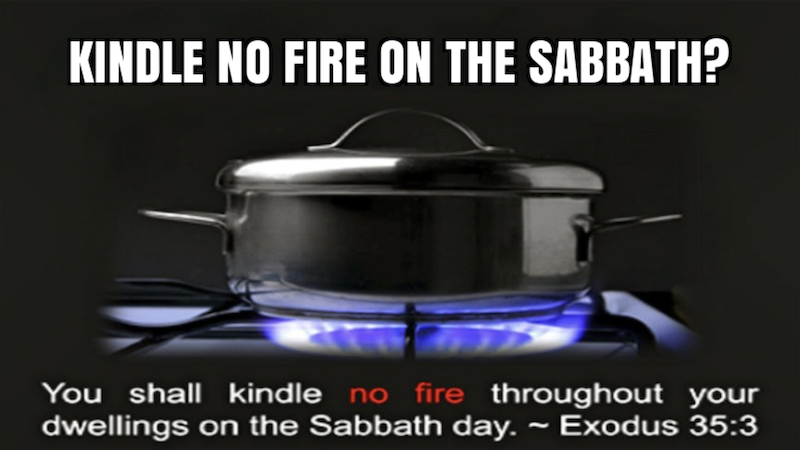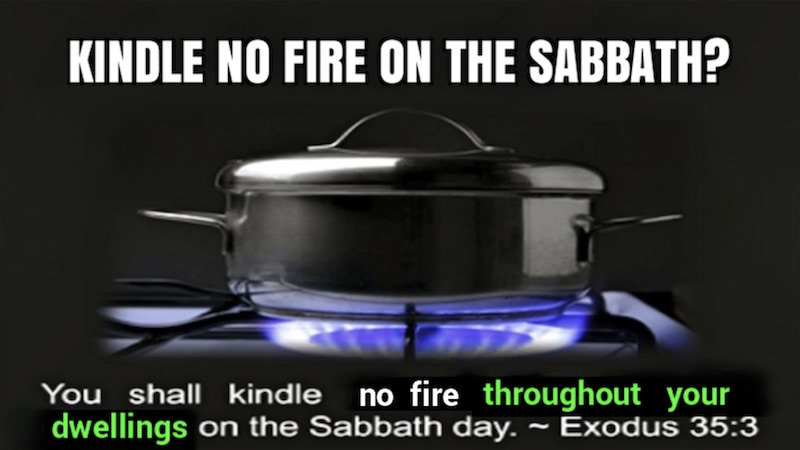This article will discuss the historic and modern-day application of the Exodus 35:3 verse, to kindle no fire throughout your dwellings on the Sabbath day.
Why does God command us to not kindle a fire in our dwellings on the Sabbath day?
kindle:
To light or set on fire.
EXODUS 35:1-3 (NKJV):
Then Moses gathered all the congregation of the children of Israel together, and said to them, “These are the words which YHWH (the Lord) has commanded you to do: Work shall be done for six days, but the seventh day shall be a holy day for you, a Sabbath of rest to YHWH (the Lord). Whoever does any work on it shall be put to death. You shall kindle no fire throughout your dwellings on the Sabbath day.”
When read in its full context, not lighting a fire on the Sabbath day pertains to keeping the Sabbath properly. The question is, Why are we not to light a fire in our dwellings on the Sabbath day?
God does not want us to cook on the Sabbath. Lighting a fire to cook on a stove is labor that is not to be conducted on the Sabbath day.
God wants us to set apart the Sabbath day, as holy and special, from Friday sundown through Saturday sundown. We are not to buy or sell at marketplaces or eat at restaurants on the Sabbath, nor do any work on the Sabbath, which would include kindling a fire in our dwellings to do laborious cooking.
MARK 15:42 (NKJV):
Now when evening had come, because it was the Preparation Day, that is, the day before the Sabbath…
The Day of Preparation or the Preparation Day is on Friday before sundown. Food is to be prepared beforehand on the Preparation Day to be served throughout the Sabbath. The labor of cooking food shall not be done on the Sabbath day.
TRADITIONALTALMUDIC JUDAISM SABBATH OBSERVANCE
Formal Talmudic observance of the Shabbat, or Sabbath, begins with the woman of the home lighting the Sabbath candles on Friday before sundown before the Sabbath begins. It is customary to light one candle for each member of the household [1].
ISAIAH 50:11 (NKJV):
Look, all you who kindle a fire, who encircle yourselves with sparks: walk in the light of your fire and in the spark you have kindled. This you shall have from My hand: you shall lie down in torment.
The Jewish people certainly have suffered torment since Isaiah was written around 740 B.C. The Jewish traditional practice of setting up and lighting candles just before the Sabbath begins is not a command from God. Ritualistic candle lighting is associated with the occult and witchcraft and believers are not to partake in such practices (Deuteronomy 18:10-11). The Talmudic ritualistic pre-Sabbath candle-lighting tradition may not rise to the level of practicing witchcraft, but there is no Torah command from God to observe this practice. Furthermore, to keep candles burning throughout the home on the Sabbath is literally creating a potential fire hazard [2].
ADDING TO GOD’S LAWS
DEUTERONOMY 4:2, 12:32 (NKJV):
“You shall not add to the word which I command you, nor take from it, that you may keep the commandments of YHWH (the Lord) your God which I command you.” … “Whatever I command you, be careful to observe it; you shall not add to it nor take away from it.”
PROVERBS 30:6 (NKJV):
Do not add to His words, lest He rebuke you, and you be found a liar.
The command against kindling a fire on the Sabbath is specifically restricted to lighting a fire inside dwellings. “You shall kindle no fire throughout your dwellings on the Sabbath day.” – Exodus 35:3.
There is no command from God against lighting a fire outside of dwellings on the Sabbath day. Therefore it is perfectly lawful to ignite an auto’s internal combustion engine on the Sabbath and to turn on and off electrical appliances on the Sabbath, as the energy generated to operate such appliances is generated outside of dwelling places.
Talmudic Judaism forbids the use of motor vehicles, electricity, and telephones on the Sabbath, because they consider igniting an auto’s internal combustion engine and the use of electricity kindling a fire on the Sabbath. In a traditional Talmudic-observant Jewish home, family members unhook telephones, unscrew light bulbs, and tape switches down so as to not accidentally turn on an electric appliance. They make an electricity exception for their refrigerators, which they leave plugged in so as to keep food from spoilage, but they place tape over the fridge’s interior light switch so that the light will not go on when someone opens the refrigerator door. Recently, manufacturers began making Sabbath-mode refrigerators that have a switch to keep the fridge’s interior light off on the Sabbath. In Israel and in many Jewish-owned buildings elsewhere, elevators are set to automatically stop on every floor, so that those who enter the elevator do not need to push an elevator button (which is considered ‘work’ by Talmudic Judaism).
God does not forbid the use of electricity on the Sabbath day. It should not be considered work to flip a switch or to push an elevator button any more than it should be considered work to pluck grain on the Sabbath and eat (Matthew 12:1-8; Mark 2:23-28).
Overusing energy by needlessly running electricity continually throughout the Sabbath day, for the sake of refusing to flip a switch, is a waste of God-given blessings of energy, money, and natural resources.
The Sabbath day is a day of holiness, rest, and refreshment. It is a day for man to rest, not for the automobiles and electronics that serve man to rest. It is not a command from God to refrain from using a car or electricity on the Sabbath day.
Traditional Orthodox Talmudic Jews often walk long distances to synagogues for Sabbath observance. Those who have to travel far for services are often exhausted from their long walks to and from synagogues. The mistake that Talmudic Judaism makes is that the Sabbath is a day of rest for man, not for the automobiles and machines that serve man.
The command to not kindle a fire on the Sabbath day pertains to lighting a fire within a dwelling. The igniting and fuel burning of an automobile is done outside a dwelling. A power plant that burns fuel to provide electricity throughout a home is done outside of a dwelling. Teaching to not burn a fire at all, anywhere – even outside of a dwelling, is adding to Scripture and we are commanded to not add to His word (Deuteronomy 4:2, 12:32; Proverbs 30:6).
MARK 2:27 (NKJV):
“The Sabbath was made for man, and not man for the Sabbath.”
The Sabbath was made for man, not for our motorized vehicles, and not for man to serve the Sabbath.
Taking extraordinary measures in observing the Sabbath, such as unscrewing light bulbs and refusing motorized transport while instead opting to physically exert oneself in walking long distances, is an example of man serving the Sabbath and not being served by the Sabbath. Igniting an automobile’s spark plug and fuel system is not kindling a fire within a dwelling, as motorized internal combustion propelled vehicles are transportation machines ignited outside of the home that serve and aid us in resting as we travel on the Sabbath.
The Sabbath was meant to serve man and not for man to serve the Sabbath. We are not to kindle fires in our dwellings on the Sabbath, as we are to rest from all labor including the labor of cooking. The Sabbath was made for man, not for cars and electronics.
1. Eckstein, Yechiel, “Shabbat: A Day of Delight,” International Fellowship of Christians and Jews, 2015, <http://www.ifcj.org/assets/pdfs/limmud_oct_sabbath_final.pdf>.
2. Jerenberg, Batya, “Holiday tragedy: Woman dies in fire started by Sabbath candles,” World Israel News, October 18, 2022, < https://worldisraelnews.com/holiday-tragedy-woman-dies-in-fire-started-by-sabbath-candles/ >




